U.S. seeks meeting with prospective India leader Narendra Modi

- Share via
MUMBAI, India -- In a bid to head off another potential crisis in U.S.-Indian relations, the State Department has requested a meeting with a controversial Indian politician who is a front-runner to become the country’s next prime minister, officials said Tuesday.
The meeting between the U.S. ambassador to New Delhi, Nancy Powell, and Indian politician Narendra Modi is scheduled to take place later this week and would end a decade-long chill that began when the State Department refused to grant Modi a visa to the United States in 2005.
That decision stemmed from Modi’s tenure as leader of the western state of Gujarat, where communal riots in 2002 left more than 1,000 people dead, most of them Muslims. After a lobbying campaign led by evangelical Christian groups, the State Department denied Modi a visa, saying he bore ultimate responsibility for the failure of Gujarati authorities to protect minority Muslims.
Modi has steadfastly denied culpability, and an Indian court ruled in December that there wasn’t enough evidence to prosecute him. Meanwhile, Gujarat, which he still leads, has become an economic engine and attracted investment by U.S. companies such as Ford and General Motors.
As the opposition Bharatiya Janata Party’s candidate for prime minister, Modi is touting his economic record and is widely seen as the favorite to win India’s top post in elections this May.
A State Department official described the meeting between Modi and Powell as “part of our concentrated outreach to senior political and business leaders which began in November to highlight the U.S.-India relationship.” The meeting could occur as early as Thursday in Gujarat, according to Bharatiya Janata Party officials quoted by Indian news media.
As recently as last June, the State Department said its policy on granting Modi a visa had not changed. “We will consider his application if he applies,” spokeswoman Jen Psaki said.
Officials of his party said Modi was unlikely to apply for a U.S. visa anytime soon. But the State Department’s decision to end its boycott of the 63-year-old leader reflects a desire to patch relations with India that remain marred by mutual suspicion despite growing investment by American companies and India’s efforts to portray itself as a rising world power.
“If opinion polls are anything to go by, Washington will soon have to do business with a government in New Delhi headed by Modi,” Viju Cherian, a journalist with the Hindustan Times daily, wrote Tuesday.
Other countries have decided to end boycotts of Modi, with the British high commissioner and European ambassadors in New Delhi holding meetings with him in recent months. U.S. consular officials, members of Congress and business leaders have paid visits to Modi in Gujarat, but the meeting with Powell would be the highest-level contact by a U.S. official since Modi’s visa was revoked.
U.S.-India ties were badly strained in December, when an Indian diplomat in New York was arrested and charged with visa fraud for lying about underpaying her housekeeper. The diplomat, Devyani Khobragade, did not appear in U.S. court and was allowed to return to India after Indian officials began revoking perks -- such as permits to import alcohol duty-free -- for U.S. diplomats in New Delhi.
Twitter: @SBengali
More to Read
Sign up for Essential California
The most important California stories and recommendations in your inbox every morning.
You may occasionally receive promotional content from the Los Angeles Times.














